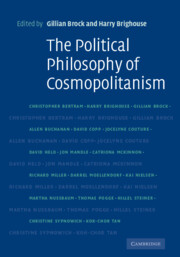Book contents
- Frontmatter
- Contents
- List of contributors
- Preface
- 1 Introduction
- 2 Principles of cosmopolitan order
- 3 Territorial justice and global redistribution
- 4 International justice and the basic needs principle
- 5 Cosmopolitans, cosmopolitanism, and human flourishing
- 6 Global justice, moral development, and democracy
- 7 A cosmopolitan perspective on the global economic order
- 8 In the national interest
- 9 Cosmopolitan respect and patriotic concern
- 10 Persons' interests, states' duties, and global governance
- 11 The demands of justice and national allegiances
- 12 Cosmopolitanism and the compatriot priority principle
- 13 Beyond the social contract: capabilities and global justice
- 14 Tolerating injustice
- 15 Cosmopolitan hope
- Bibliography
- Index
8 - In the national interest
Published online by Cambridge University Press: 04 December 2009
- Frontmatter
- Contents
- List of contributors
- Preface
- 1 Introduction
- 2 Principles of cosmopolitan order
- 3 Territorial justice and global redistribution
- 4 International justice and the basic needs principle
- 5 Cosmopolitans, cosmopolitanism, and human flourishing
- 6 Global justice, moral development, and democracy
- 7 A cosmopolitan perspective on the global economic order
- 8 In the national interest
- 9 Cosmopolitan respect and patriotic concern
- 10 Persons' interests, states' duties, and global governance
- 11 The demands of justice and national allegiances
- 12 Cosmopolitanism and the compatriot priority principle
- 13 Beyond the social contract: capabilities and global justice
- 14 Tolerating injustice
- 15 Cosmopolitan hope
- Bibliography
- Index
Summary
THE DOMINANCE OF A DOGMA
Few deny that the national interest should play a major role in foreign policy. But often much stronger assertions about the national interest are made or, more frequently, uncritically assumed to be true. The strongest of these, and the one explicitly endorsed by many state leaders and diplomats, as well as many theorists of international relations, is that
A state's foreign policy always ought to be determined exclusively by the national interest (the Obligatory Exclusivity Thesis).
“Foreign policy” here is understood very broadly, to encompass the state's policies of making war and seeking peace, its posture toward international law, its participation in the global economy through treaties concerning trade and communications infrastructures, international financial and monetary regimes, and the provision of aid to other countries.
Hans Morgenthau, one of the most influential international relations theorists of the twentieth century, unambiguously proclaimed the supremacy of the national interest, asserting that it should be “the one guiding star, one standard thought, one rule of action” in foreign policy (Morgenthau, 1952, p. 242). Taken literally, Morgenthau's assertion presupposes that every foreign policy decision affects the national interest one way or the other. Since this is dubious, and because I am interested in evaluating the more plausible versions of the idea that the national interest should reign supreme in foreign policy, I will understand the Obligatory Exclusivity Thesis as acknowledging that some decisions may not affect the national interest one way or another and as permitting other considerations to guide policy when that is the case.
- Type
- Chapter
- Information
- The Political Philosophy of Cosmopolitanism , pp. 110 - 126Publisher: Cambridge University PressPrint publication year: 2005
- 2
- Cited by



